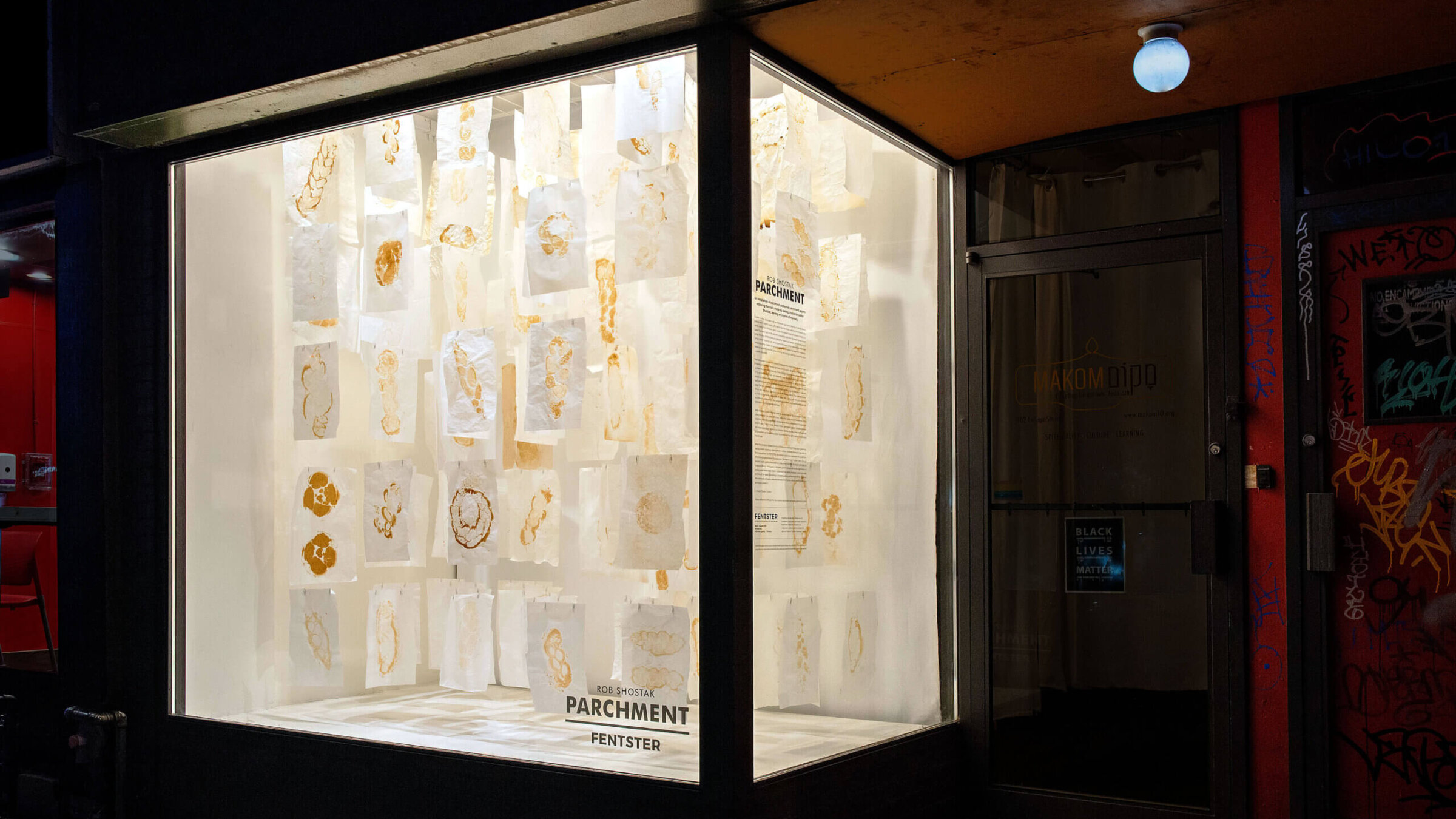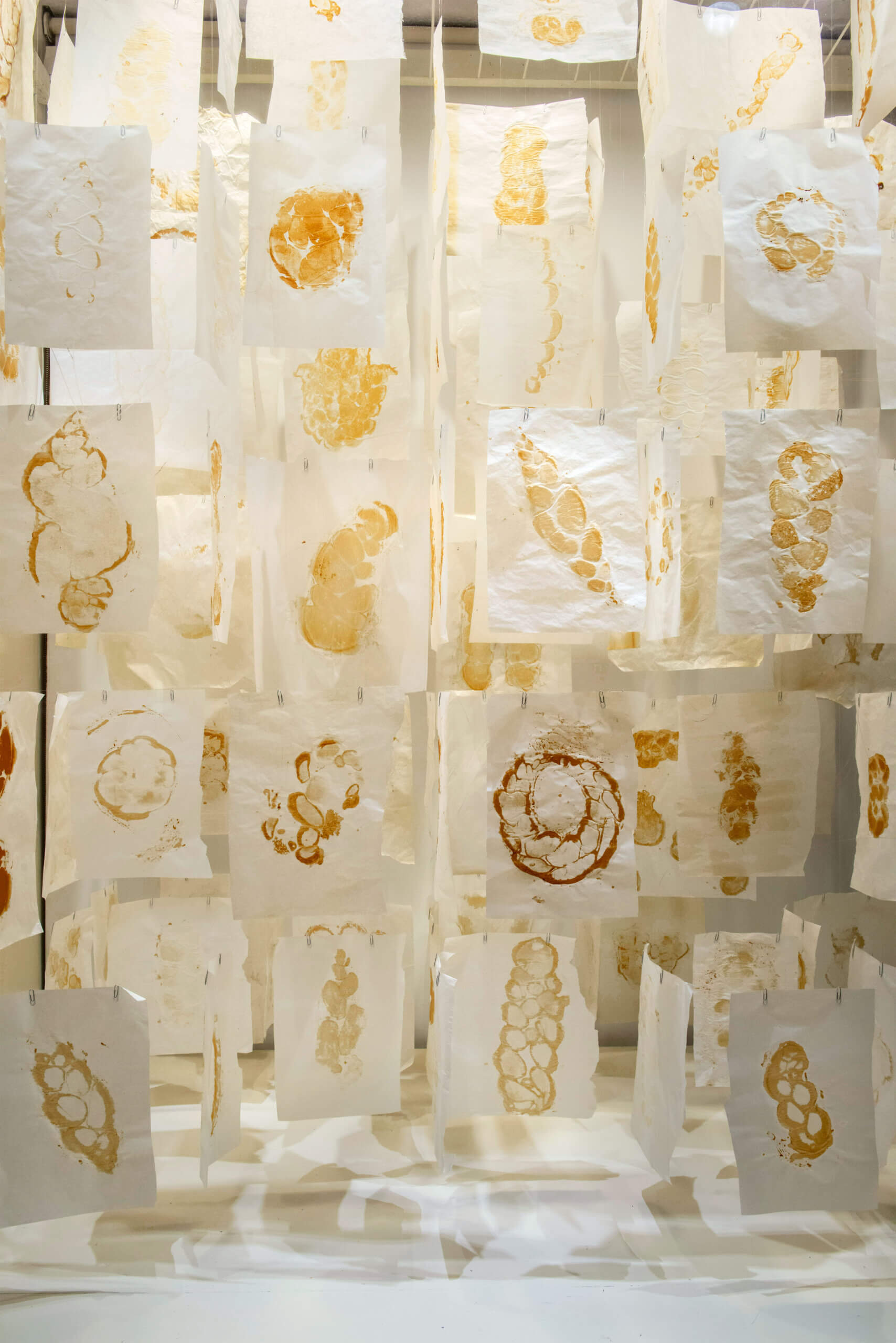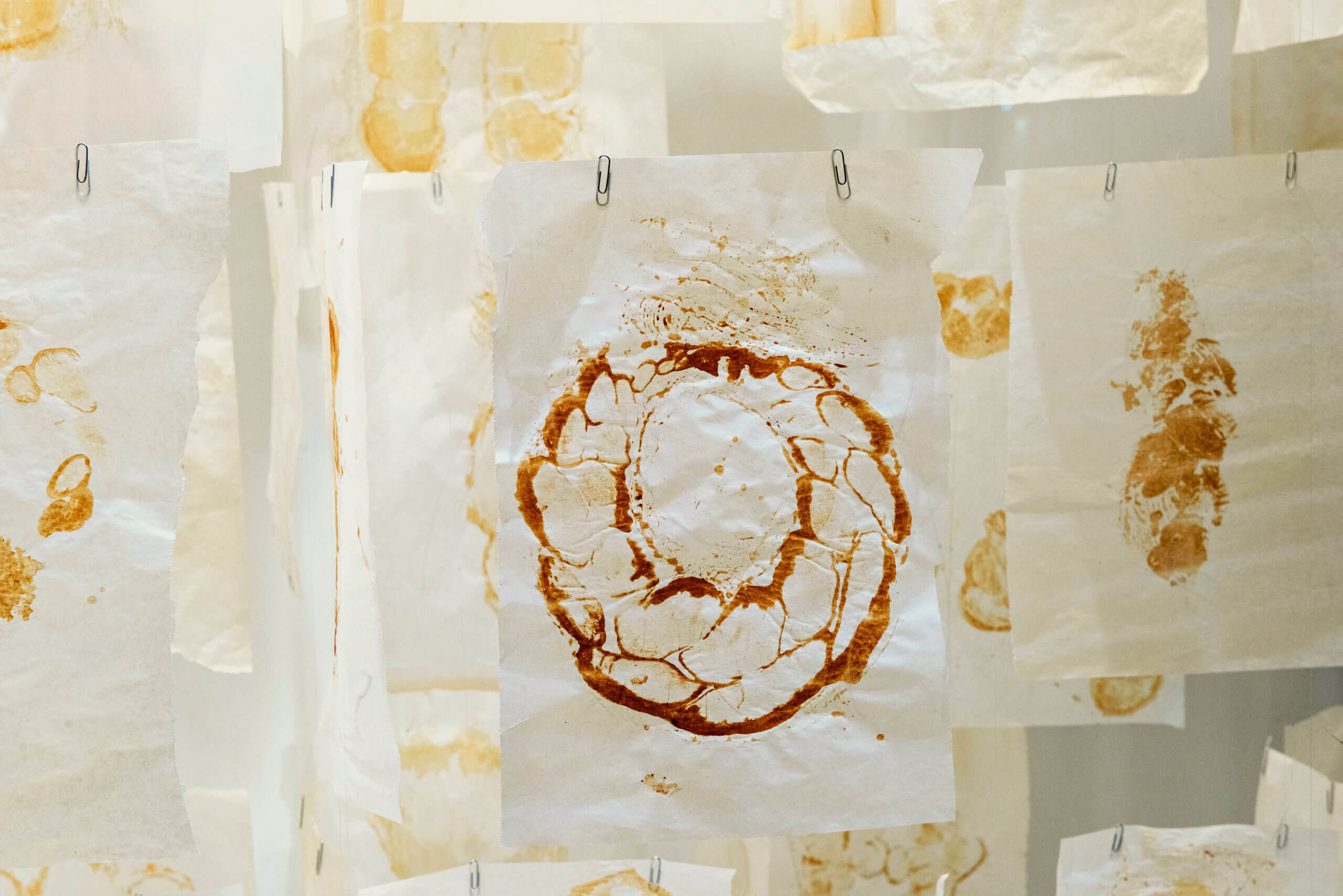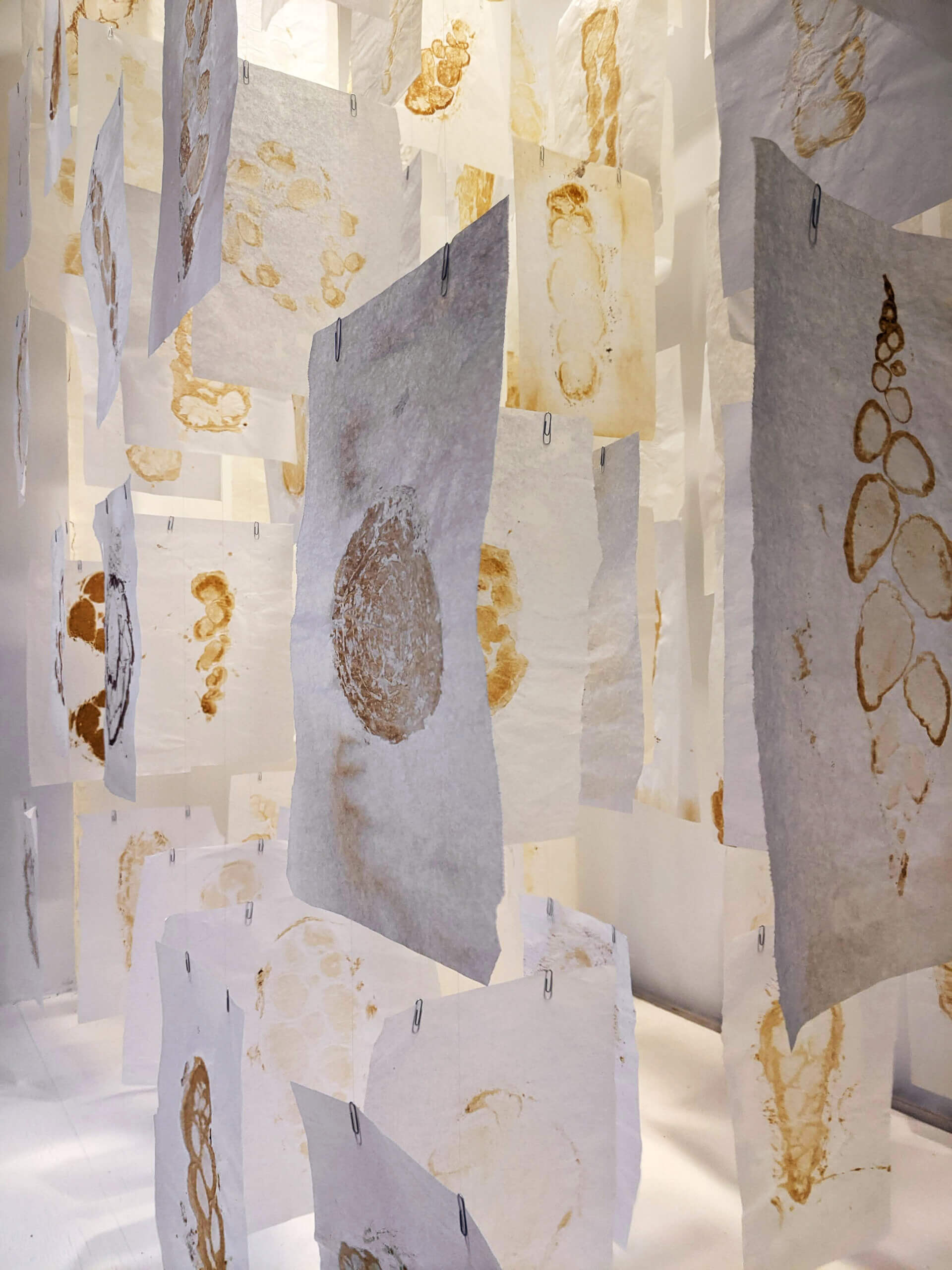The ephemeral beauty of a loaf of challah, immortalized in art
An archive of challahs past, ‘Parchment,’ from artist Rob Shostak, makes use of the delicate imprints each loaf leaves during the baking process

“Parchment” installed at Fentster, viewable by passers-by. Tauben said the exhibit causes a lot of double-takes. Photo by Morris Lum
The evidence of a good challah is its absence — give or take a few crumbs. But artist Rob Shostak realized there’s another remnant of the Shabbat loaf: the paper the loaf is baked on, scorched with the imprint of the bread. And so his installation, “Parchment,” was born.
The piece is installed at Fentster, a gallery curated in the storefront window of a Jewish community in Toronto called Makom. (“Fentster” means “window” in Yiddish.) The little gallery was founded and is run by Evelyn Tauben, a producer and curator who often helps shape and shepherd the pieces that find their home in her space.

“Parchment” was even more of a team effort than usual — Shostak solicited parchment paper from home bakers across Toronto and the world and ran a Zoom challah baking class to help churn out parchments. He even got a submission from Jurgen Krauss, the lovable German from the most recent season of the Great British Bake Off.
Shostak said he grew up having huge Shabbat meals with his extended family, often with 20 people at the table. But out of respect for the more observant members of the family, they never took photos.
“These kind of take that place. They are the photographs, the evidence of things,” Shostak said of the parchments. “Here I’m trying to collect these as an archive, to preserve these memories in some way.”
Shostak, 40, has a degree in architecture and used drafting software to map the piece out to maximize how many pieces of parchment he could include in the installation. He hung 120 parchments in a 3D grid, creating a depth of field that’s viewable from multiple angles. They all bear an imprint, but they range in hue from a pale golden yellow to a deep umber brown, some ghostly and some crisply outlined, shaped in a braid or a circle, each telling a story about the recipe and the baker.

One baker makes hearts on his bakes, so he embedded a heart made of dough into the bottom of his round loaf that imprinted on the parchment. Another loaf was long and thin, which Shostak hypothesized was because the baker’s young daughter could hold the thinner loaf in her small hands.
“Each paper is kind of like a fingerprint, and yet there’s only so much variation because that’s the tradition,” Tauben told me over Zoom. “It’s kind of like contemporary Jewish life in and of itself. We all find our own way of being Jewish, and mine looks a little different from yours, but there’s hallmarks, there’s distinctive fingerprints.”
It’s not just up to the parchment to tell the story — Shostak also asked for stories with the submissions, and though not everyone sent an anecdote, the people who did wrote out lengthy heartfelt tales of family and Jewish identity, and about how baking challah connected them across generations or connected them to Judaism — including some people who had never baked before the project. Though baking is an individual, at-home task, it felt communal knowing that people across the world were doing the same thing.

Shostak has his own story. Moving to Toronto for graduate school from his native Montreal, where he’d lived in a Jewish neighborhood and gone to a Jewish school, he felt disconnected from the Jewish community in his new city. He wanted to host meals with his then-new partner, but the pandemic intervened. It seemed impossible to find the Jewish community he wanted.
So when Tauben reached out to him about Fentster, he had been thinking about making an installation about his feeling of disconnection from Judaism. But Shostak and his partner began baking challah at home, hoping to connect to tradition at least between the two of them. Inspired by the pattern burned into his own baking sheet one day, he began soliciting submissions for “Parchment.” And in the process, he found community and tradition that reached far outside his own kitchen.
“Now, it’s like, I know so many people,” he said. “There is this welcoming into the community.”
The Forward is free to read, but it isn’t free to produce

I hope you appreciated this article. Before you go, I’d like to ask you to please support the Forward.
Now more than ever, American Jews need independent news they can trust, with reporting driven by truth, not ideology. We serve you, not any ideological agenda.
At a time when other newsrooms are closing or cutting back, the Forward has removed its paywall and invested additional resources to report on the ground from Israel and around the U.S. on the impact of the war, rising antisemitism and polarized discourse.
This is a great time to support independent Jewish journalism you rely on. Make a gift today!
— Rachel Fishman Feddersen, Publisher and CEO
Support our mission to tell the Jewish story fully and fairly.
Most Popular
- 1

Culture Cardinals are Catholic, not Jewish — so why do they all wear yarmulkes?
- 2

Fast Forward Ye debuts ‘Heil Hitler’ music video that includes a sample of a Hitler speech
- 3

News School Israel trip turns ‘terrifying’ for LA students attacked by Israeli teens
- 4

Fast Forward Student suspended for ‘F— the Jews’ video defends himself on antisemitic podcast
In Case You Missed It
-

Yiddish קאָנצערט לכּבֿוד דעם ייִדישן שרײַבער און רעדאַקטאָר באָריס סאַנדלערConcert honoring Yiddish writer and editor Boris Sandler
דער בעל־שׂימחה האָט יאָרן לאַנג געדינט ווי דער רעדאַקטאָר פֿונעם ייִדישן פֿאָרווערטס.
-

Fast Forward Trump’s new pick for surgeon general blames the Nazis for pesticides on our food
-

Fast Forward Jewish feud over Trump escalates with open letter in The New York Times
-

Fast Forward First American pope, Leo XIV, studied under a leader in Jewish-Catholic relations
-
Shop the Forward Store
100% of profits support our journalism
Republish This Story
Please read before republishing
We’re happy to make this story available to republish for free, unless it originated with JTA, Haaretz or another publication (as indicated on the article) and as long as you follow our guidelines.
You must comply with the following:
- Credit the Forward
- Retain our pixel
- Preserve our canonical link in Google search
- Add a noindex tag in Google search
See our full guidelines for more information, and this guide for detail about canonical URLs.
To republish, copy the HTML by clicking on the yellow button to the right; it includes our tracking pixel, all paragraph styles and hyperlinks, the author byline and credit to the Forward. It does not include images; to avoid copyright violations, you must add them manually, following our guidelines. Please email us at [email protected], subject line “republish,” with any questions or to let us know what stories you’re picking up.
















